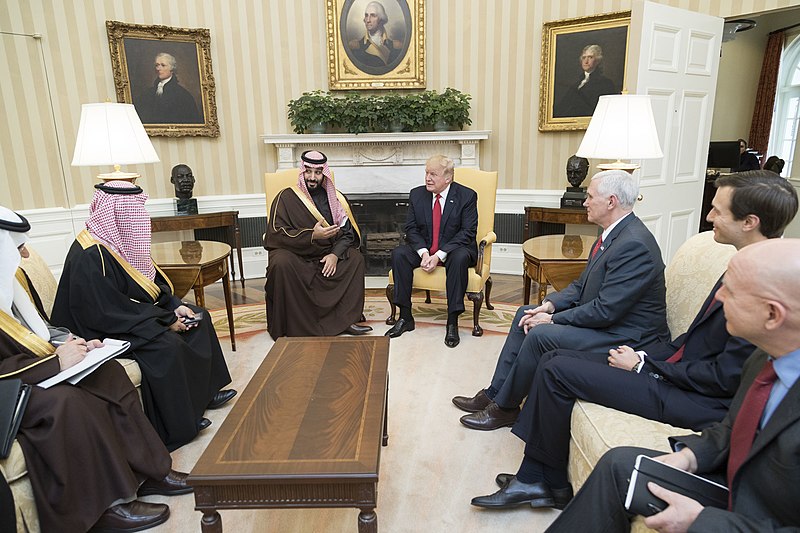Former White House adviser and son-in-law to twice-impeached former President Donald Trump, Jared Kushner is known for overseeing the Trump administration’s foreign policies in the Middle East. Largely staying out of the political scene, a recent report reveals that Kushner has been trying to raise funds for his investment firm in the Middle East.
The New York Times reported that Kushner is looking to raise money from the Middle East for a new investment firm and has not had much success. The former White House adviser was reportedly unsuccessful in Qatar, whose leadership saw Kushner as an opponent to the administration. The Emirati also turned Kushner down because despite seeing Kushner as an ally, they questioned his business track records, according to people familiar with the matter.
From all the Middle Eastern nations that Kushner has looked to raise money from, Saudi Arabia was the country that was the most interested, according to the report.
“The Saudis are more interested, according to four people briefed on their continuing negotiations,” said the report. “The Kingdom’s $450 billion Public Investment Fund is negotiating with Mr. Kushner over what could prove to be a sizeable investment in his new firm, two of those people said.”
Under his father-in-law’s presidency, Kushner was responsible for overseeing so-called peace deals in the Middle East, playing a role in agreements to make Arab and North African countries recognize the Israeli government, called the Abraham Accords. The deals would often lead to the US seemingly legitimizing human rights violations of those same countries.
Back in October, Kushner and his wife Ivanka Trump traveled to Jerusalem to visit Israeli lawmakers who have launched the Abraham Accords caucus in the country’s parliament. In his remarks, Kushner said that the agreements brought on a “new paradigm” in the region that would lead to different outcomes depending on the countries. The accords were a step away from the consensus among Arab states not to recognize Israel until its conflict with Palestine was resolved.
At the time, the agreement was signed by then-Prime Minister Benjamin Netanyahu but remains to have the support of the coalition that ousted him from his position back in June.



 Netanyahu to Meet Trump in Washington as Iran Nuclear Talks Intensify
Netanyahu to Meet Trump in Washington as Iran Nuclear Talks Intensify  Anutin’s Bhumjaithai Party Wins Thai Election, Signals Shift Toward Political Stability
Anutin’s Bhumjaithai Party Wins Thai Election, Signals Shift Toward Political Stability  Sydney Braces for Pro-Palestine Protests During Israeli President Isaac Herzog’s Visit
Sydney Braces for Pro-Palestine Protests During Israeli President Isaac Herzog’s Visit  Bosnian Serb Presidential Rerun Confirms Victory for Dodik Ally Amid Allegations of Irregularities
Bosnian Serb Presidential Rerun Confirms Victory for Dodik Ally Amid Allegations of Irregularities  Bangladesh Election 2026: A Turning Point After Years of Political Suppression
Bangladesh Election 2026: A Turning Point After Years of Political Suppression  China Overturns Death Sentence of Canadian Robert Schellenberg, Signaling Thaw in Canada-China Relations
China Overturns Death Sentence of Canadian Robert Schellenberg, Signaling Thaw in Canada-China Relations  Jack Lang Resigns as Head of Arab World Institute Amid Epstein Controversy
Jack Lang Resigns as Head of Arab World Institute Amid Epstein Controversy  Ohio Man Indicted for Alleged Threat Against Vice President JD Vance, Faces Additional Federal Charges
Ohio Man Indicted for Alleged Threat Against Vice President JD Vance, Faces Additional Federal Charges  Nicaragua Ends Visa-Free Entry for Cubans, Disrupting Key Migration Route to the U.S.
Nicaragua Ends Visa-Free Entry for Cubans, Disrupting Key Migration Route to the U.S.  Trump Signs Executive Order Threatening 25% Tariffs on Countries Trading With Iran
Trump Signs Executive Order Threatening 25% Tariffs on Countries Trading With Iran  Japan’s Prime Minister Sanae Takaichi Secures Historic Election Win, Shaking Markets and Regional Politics
Japan’s Prime Minister Sanae Takaichi Secures Historic Election Win, Shaking Markets and Regional Politics  Trump Slams Super Bowl Halftime Show Featuring Bad Bunny
Trump Slams Super Bowl Halftime Show Featuring Bad Bunny  Antonio José Seguro Poised for Landslide Win in Portugal Presidential Runoff
Antonio José Seguro Poised for Landslide Win in Portugal Presidential Runoff  US Pushes Ukraine-Russia Peace Talks Before Summer Amid Escalating Attacks
US Pushes Ukraine-Russia Peace Talks Before Summer Amid Escalating Attacks  Israel Approves West Bank Measures Expanding Settler Land Access
Israel Approves West Bank Measures Expanding Settler Land Access  Taiwan Says Moving 40% of Semiconductor Production to the U.S. Is Impossible
Taiwan Says Moving 40% of Semiconductor Production to the U.S. Is Impossible  Trump Allows Commercial Fishing in Protected New England Waters
Trump Allows Commercial Fishing in Protected New England Waters 































